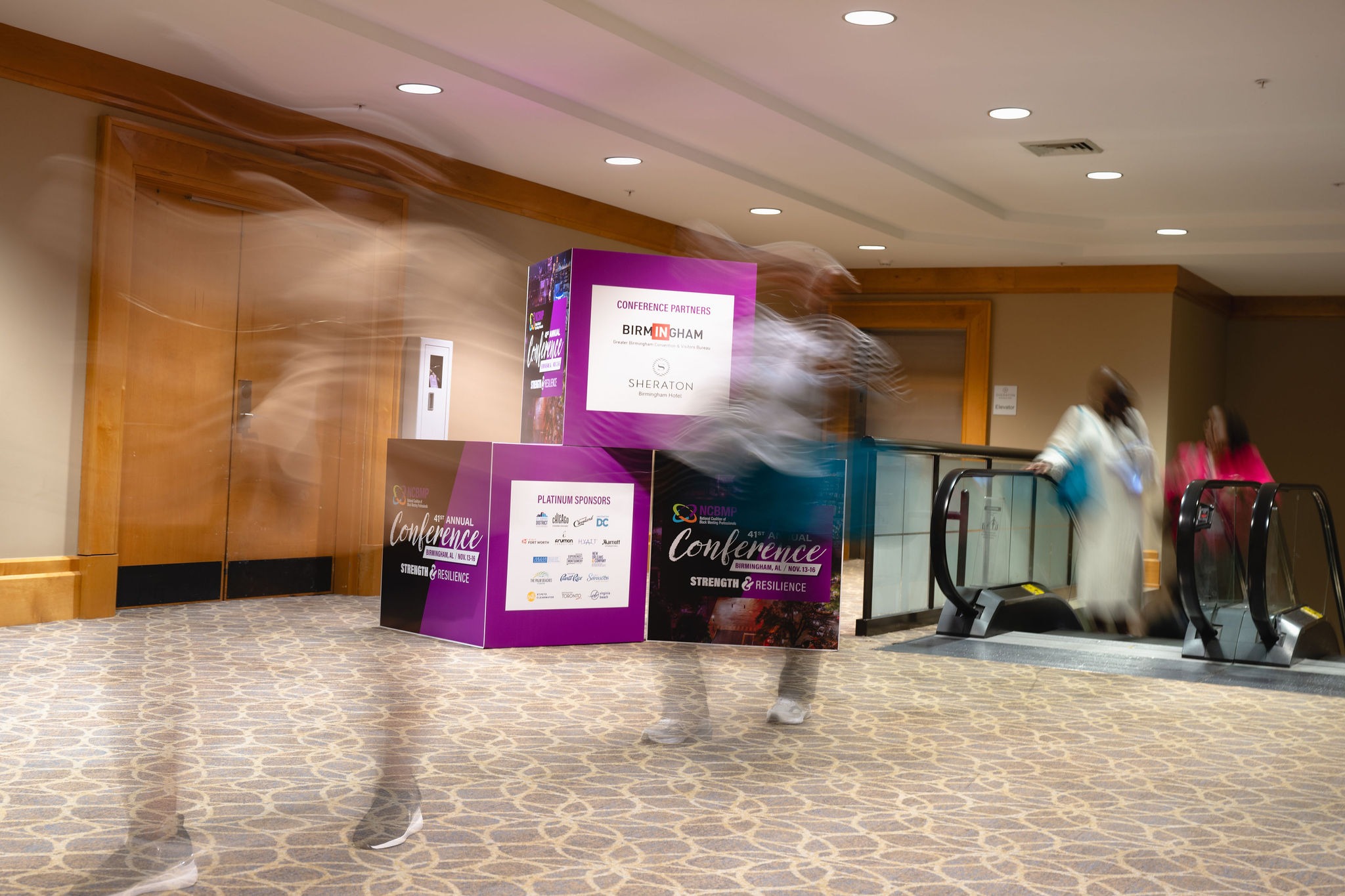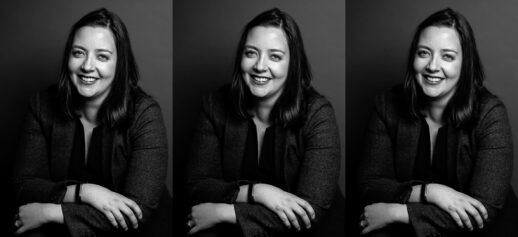The Coalition’s 41st convention emphasized strength and resilience
National Coalition of Black Meeting Professionals (NCBMP) held its 41st annual convention in Birmingham, Alabama, at Sheraton Birmingham Hotel and Westin Birmingham Hotel Nov. 13-16.
This year’s theme, Strength and Resilience, was an acknowledgement that the 2024 elections and the resulting shifts in DEI legislation would engender tension among attendees, says Jason Dunn, executive director at NCBMP. “We knew that a lot of our members were facing that [tension] internally, so we wanted to inspire them to find the inner strength to keep fighting and not to give up, to keep proving themselves and not to be dismayed,” Dunn says.
In addition to going behind-the-scenes of this year’s NCBMP, we also take a look at several of the sessions of which more than 400 attendees took part.
Historical Beginnings
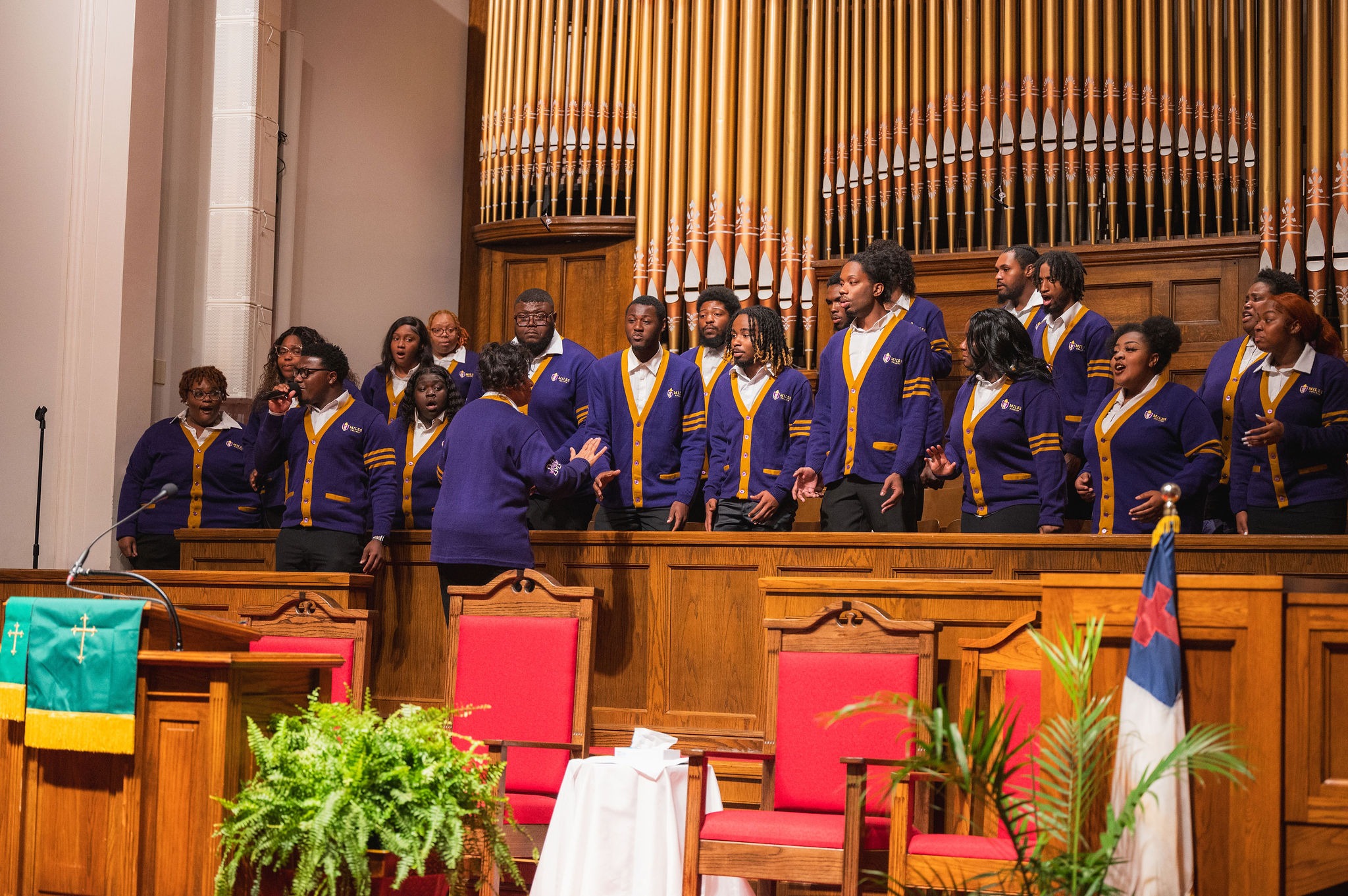
The event’s opening night took place at 16th St. Baptist Church in Birmingham, the site of a bombing by members of the KKK, on Sept. 15, 1963, which injured 14 people and caused the deaths of four adolescent girls. Those who spoke at the event included the sister of one of those girls and the brother of one of the surviving victims, in addition to the church’s pastor, Reverend Arthur Price, Jr.
What followed from the moment attendees sat down in the church was a history lesson and the formation of a connection to the city, not only through the retelling of an unforgettable moment in history, but through sitting in the pews next right next to the place the bombing occurred and listening to those who have a direct connection with that history.
Read More: How to Transform Events with Local Culture
“We wanted to remind people that, unfortunately, hate is real and it’s not some mythical occurrence that happened in a book. This really happened,” Dunn says. “It awakens the consciousness of individuals to remember that some of these organizations were created because some people could not gain entry into other organizations. It also reinstates the spiritual power of forgiveness and the strength that lies within us.
“When you’re on one accord with others in that church, you have no other choice but to remember; to walk in the shoes of those who came to praise, worship and find faith.”
Dunn wanted attendees to live in that moment and show them that although hate is out there, they can prevail. “Your inner strength and faith in the human spirit will drive and continue to push you to find common ways to push past the hate, but also find the courage that our ancestors and descendants had to make things right.”
The Sessions
Over the next couple of days, attendees would be able to further their cultural and event industry education through insightful general sessions and breakouts.
Opening Session
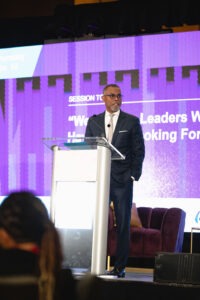
Dr. Eddie S. Glaude, Jr., presented the opening session on the following day at Sheraton Birmingham. His discussion, “We Are the Leaders We’ve Been Looking For,” was a deep reflection of the issues of race and inequality in the United States. Quoting American writer James Baldwin throughout, Glaude stated, “Baldwin is perhaps one of the most insightful American writers about the American project.”
Breakouts
After a heavy opening session, members and attendees headed to their respective breakout sessions. One of them, “Must Have Contract Clauses,” was led by attorney Joshua Grimes, who touched on the latest in contract negotiations, such as force majeure clause changes, F&B cost increases, security issues and new laws ahead.
The breakout was nearly an hour long, but one notable change made to force majeures that Grimes mentioned is the removal of the words “illegal,” “impossible,” “commercially impracticable” or “inadvisable.”
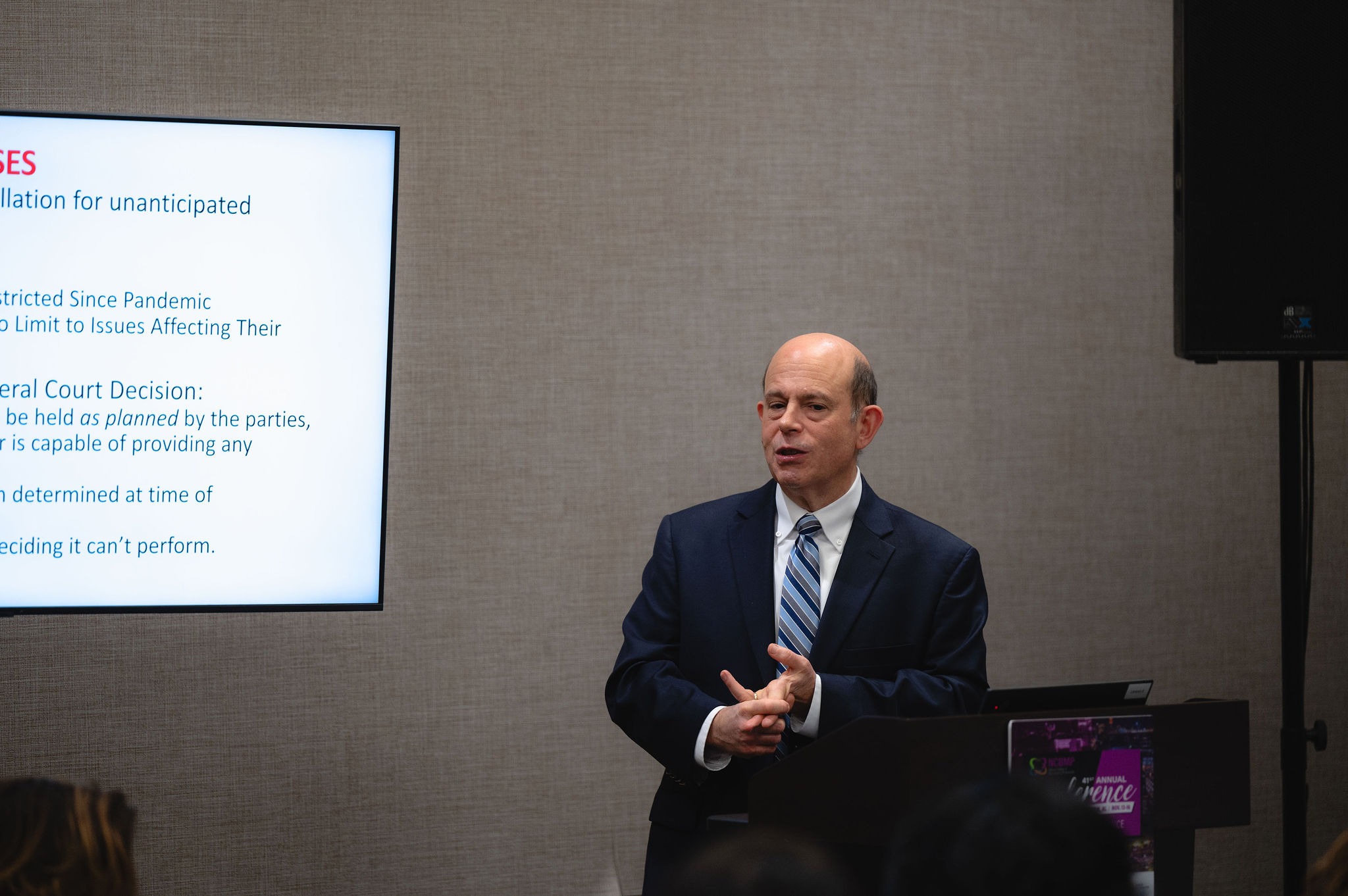
“Those words are gone from most hotel contracts,” he says. “You can negotiate it back in, but what’s the difference? Let’s look at Covid. If you want to cancel because it’s illegal or impossible to have your meeting, you must have the government say you cannot meet, or the hotel, vendor or convention center must be closed. Anything else is not going to be a force majeure. I’m not going to talk about the reasons for that, but it is a purposeful restriction on making it harder to cancel.”
Other sessions included discussions by Dr. Ruha Benjamin, titled “Reckoning with the Future of Technology & Society.” Benjamin discussed taking advantage of other types of AI: ancestral intelligence and abundant imagination, to stop looking without and begin searching within.
Yet, as we can’t fully pull away from technology, there were also sessions on how to better use the event tech we have at hand. One such session was “AI EventXcelerator” presented by PCMA. The interactive session taught participants about PCMA’s AI technology Spark.
Giving Back to the Younger Generation
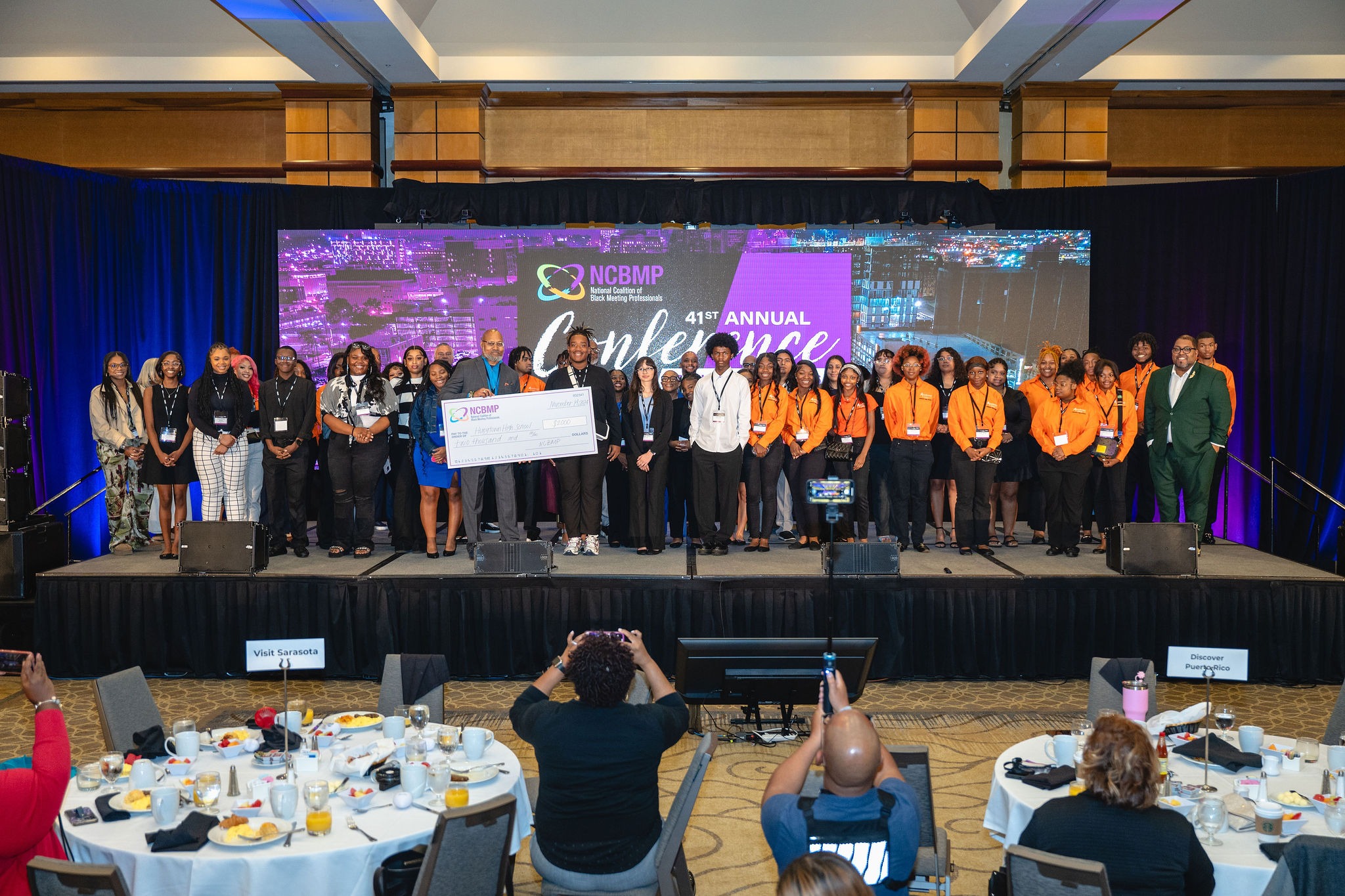
Throughout the event, there were several sessions where NCBMP presented donations to high school students to purchase caps and gowns. There were also college-aged attendees at the event, who brought aspirations to work in hospitality, and their presence placed them right next to those with decades of experience in the industry.
For Dunn, the driver of including the younger generation is plain and simple: “I believe what people see is what they will be.”
He highlighted the rarity of seeing a person of color running a hotel, or working in any high-level capacity in hospitality: your CEOs, vice presidents, directors, etc. “We want [the younger generation] to see all the facets of hospitality in every category,” Dunn says. “To do that, we have to show it by inviting them to the conference. In addition, it’s our responsibility to give back to the schools, to ease some of the burdens, and show that we are investing in them. We want them to grow. So if you leave there and we’re paying for your caps and gowns to graduate as a student who’s in hospitality, that just tells you we got your back.”
In addition to donations, NCBMP also provides mentorship for these students. “Some of those students leave [the conference] with job opportunities for when they leave high school, if they don’t want to go to college,” Dunn says. For these opportunities, NCBMP partners with several large hotel companies like Marriott International, MGM International, Memphis Convention and Visitors Bureau, Visit Orlando, Oak View Group and more.
Dunn went on to say they want to battle the misperception that you have to go to school to make six figures or to work in hospitality. That isn’t the route Dunn took, nor is it the route many of NCBMP’s members and attendees took. “We wanted to show them the entry points, different perspectives and categories in the industry, and just keep them inspired…The various schools we work with, we’re going to have long-term relationships with them, not just for the week of the conference.”
Toronto Sees the Vision
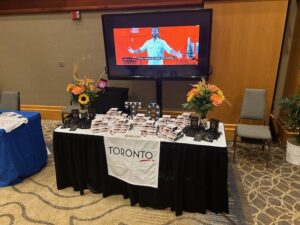 When Vinita Das, sales director, U.S. market at Destination Toronto, attended NCBMP last year, she knew she needed to come back. This year, she did, with Destination Toronto as a sponsor. “These are meeting professionals that plan and host significant meetings and conferences,” Das says. “So it’s an important audience and I wanted to be in line with them. Toronto is such a multicultural city, and we want to be intentional about engaging with diverse communities in the industry. It’s something we thought would be important to be a part of, and not only be a part, but be a sponsor.”
When Vinita Das, sales director, U.S. market at Destination Toronto, attended NCBMP last year, she knew she needed to come back. This year, she did, with Destination Toronto as a sponsor. “These are meeting professionals that plan and host significant meetings and conferences,” Das says. “So it’s an important audience and I wanted to be in line with them. Toronto is such a multicultural city, and we want to be intentional about engaging with diverse communities in the industry. It’s something we thought would be important to be a part of, and not only be a part, but be a sponsor.”
Das says this event allows her to connect with potential clients she may not have otherwise. “I don’t attend religious conferences. There are a lot of religious planners here, so that allows me to have face-to-face interaction [with them],” she says, going on to speak about the value of friendships and networking found at NCBMP. “People like to do business with people they like, and being here in this show has really strengthened and deepened some of those relationships and elevated them to not just being industry colleagues, but friendships.”
Using the resources they have, Das says she and Destination Toronto must put in strategic thought and planning toward what shows provide the most value. “So, we want to make sure that we are at the right shows, meeting with the right people and connecting with those that have potential business for Toronto, especially those high value customers,” Das says. “I see a lot of high value customers at Coalition, and so it will continue to be a show of importance for us and overall, maintaining our presence as a brand in front of these customers.”
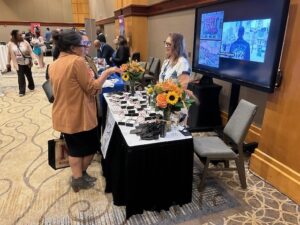
Like Das last year, this was Toronto-based event planner Dionne Bishop’s first time at NCBMP. Bishop is the owner of Events by Dionne and does consulting work with Destination Toronto. For Bishop, the event hit on two major elements that made it stand out. “I’ve not been in a space where there’s this many Black professional meeting planners,” she says. “I love education when I go to conferences. So far, it’s been top-tier, they’re talking about topics I don’t normally hear and going in depth.”
As a third-party planner, Bishop found the first breakout she attended, “Mastering RFP Responses: A 3rd Party Planner’s Perspective,” hosted by two meeting professionals from Fruition Consulting, especially helpful in giving her a better understanding of the RFP process. At many events, Dionne says, “We end up talking about how to get more business and how to help other planners advance in their own careers or businesses, but it’s usually superficial…Anyone could Google that. This was a successful company really just peeling back the curtain and breaking down their statistics.”
Bishop says, as a third-party planner, after bidding and bidding and receiving no response, she begins to wonder if the problem is her. Hearing from these other planners about their five- to six-year-long stint of not having much luck was reassuring that she isn’t.
“That was very helpful as a small business owner,” Bishop says, adding that she now has a greater understanding about it really being a numbers game. “One of the key things I learned was even though the RFP asks for a certain amount of information, go overboard, give them more and really explain and demonstrate how you’re different.”
As a planner, Bishop says something important to her is creating a “vibe.” She says in her company and with her clients, when they ask what makes her different, she tells them, “I try to produce events that have a vibe. Sometimes people are like, ‘What do you mean, “Have a vibe?’”
At NCBMP, attendees took part in a perfect example: a brief dance party in the middle of lunch. “I’ve never seen an electric slide in the middle of lunch,” Bishop says, mixed with laughter. The dance party highlighted that, although the purpose of the convention is to do business, adding playful moments here and there has its place in creating connections and lasting memories.
